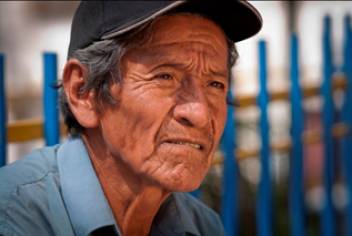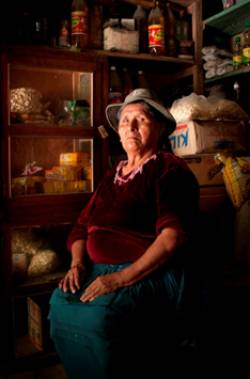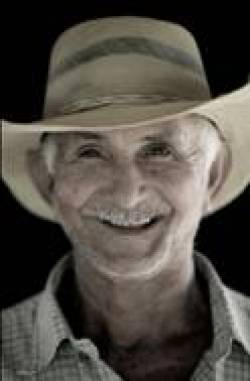Most debates about a potential convention on the human rights of older people take place in the corridors of the United Nations and in high-level meetings of government officials.
In Latin America, perhaps more so than anywhere else, there is excitement building on the matter. There is a clear consensus between most governments of the region and among civil society actors who work with older people that the time for a regional or Inter-American Convention on the Human Rights of Older People is soon!
For HelpAge International in Latin America and its network of some 40 partners, we welcome the enthusiasm for an Inter-American Convention. The draft text has been reviewed by leaders of organisations, older people and Helpage partners and many feel it adequately addresses key concerns of older people in the region.
Looking at older people’s stories from across Latin America, it is clear that older people’s lives would significantly improve if a convention came into force.
Bolivia and the right to health
 Vicente is 67 and a farmer from La Paz: “I am registered in the health insurance scheme for older people, but it doesn’t work well. As it’s free, they give us out of date medication or portions of tablets.
Vicente is 67 and a farmer from La Paz: “I am registered in the health insurance scheme for older people, but it doesn’t work well. As it’s free, they give us out of date medication or portions of tablets.
“In the hospital in Chulumani we have to wait and see if the doctor wants to turn up. The people who attend to us mistreat us. They don’t take our age into consideration. They just want to get the consultation over and done with.”
In Bolivia in 2007, President Evo Morales approved a law to implement free health insurance for all people over 60 without private health insurance. Even though the law was passed five years ago, only half of the eligible population is registered.
There are many obstacles, including:
- municipal governments not encouraging older people to register,
- staff not being trained to treat older people,
- long waiting times as younger people are treated first.
Article 17 of the draft Inter-American Convention that was shared in June states clearly that “all older persons have the right to the highest possible level of physical and mental health”. It also recognises that health workers must have the right skills to provide adequate services to older people.
Bolivia and the right to property
 Paulina, 68 is also a farmer from La Paz: “Last year my stepson took over my land. The General Secretary of the village came to defend my stepson. I said to him: ‘how can he take my land away from me?’
Paulina, 68 is also a farmer from La Paz: “Last year my stepson took over my land. The General Secretary of the village came to defend my stepson. I said to him: ‘how can he take my land away from me?’
“The Secretary shouted at me and said: ‘shut up, old woman’. He pushed me and dragged me along the ground. I hit him with my stick but he had a machete and he cut my hand.
“I went to the district lawyer in the city, who asked for two witness statements. I gave them to him but he hasn’t done anything about it.”
In Bolivia, there is growing evidence that the illegal appropriation of older people’s land is increasing. Often land grabbing includes acts of violence. The legal system to resolve these cases is expensive and full of bureaucratic hurdles. HelpAge offers socio legal services in Bolivia, but doesn’t have the jurisdiction to treat cases such as Paulina’s.
There are many mentions of older people’s right to property and freedom from violence in the draft Inter-American Convention. This includes Article 19 which states: “older persons have the right to exercise fully their right to property and not be denied it because of age”.
Colombia and the right to a secure income
 Alcides is 70 and from Caracol: “The bridge to my village has collapsed. When the river rises the only way to get out is by motorcycle and costs 60,000 pesos (US$34). If someone gets sick we have to take them on the motorcycle because there is no ambulance.
Alcides is 70 and from Caracol: “The bridge to my village has collapsed. When the river rises the only way to get out is by motorcycle and costs 60,000 pesos (US$34). If someone gets sick we have to take them on the motorcycle because there is no ambulance.
“A sick older person on a motorbike on dirt roads, and paying all that money, well you can see how difficult our situation is.”
In Colombia, the National Social Protection Programme for Older Persons is supposed to provide a means tested cash subsidy of US$40 to 435,000 of the most vulnerable older people. Less than half those eligible actually receive the subsidy.
Article 15 in the draft Inter-American Convention states that older people have the right to social security, including “non-contributory cash benefits”. It also says that “states signatory to the Convention will ensure, within available resources, that all older persons receive a minimum pension that is life long, and sufficient for a dignified life”.
Colombia is now a high middle income country. There is no doubt it can offer the said subsidy to all those eligible. An Inter-American Convention, or better still a global convention, would ensure this happens.
HelpAge International in Latin America fully supports and encourages those working tirelessly for the United Nations to approve a convention on the human rights of older people to put an end to these abuses once and for all.
Visit the HelpAge International in Latin America website (in Spanish)
Find out more about our work to support older people’s human rights
Sign the HelpAge petition and call for a UN global convention on the rights of older people
